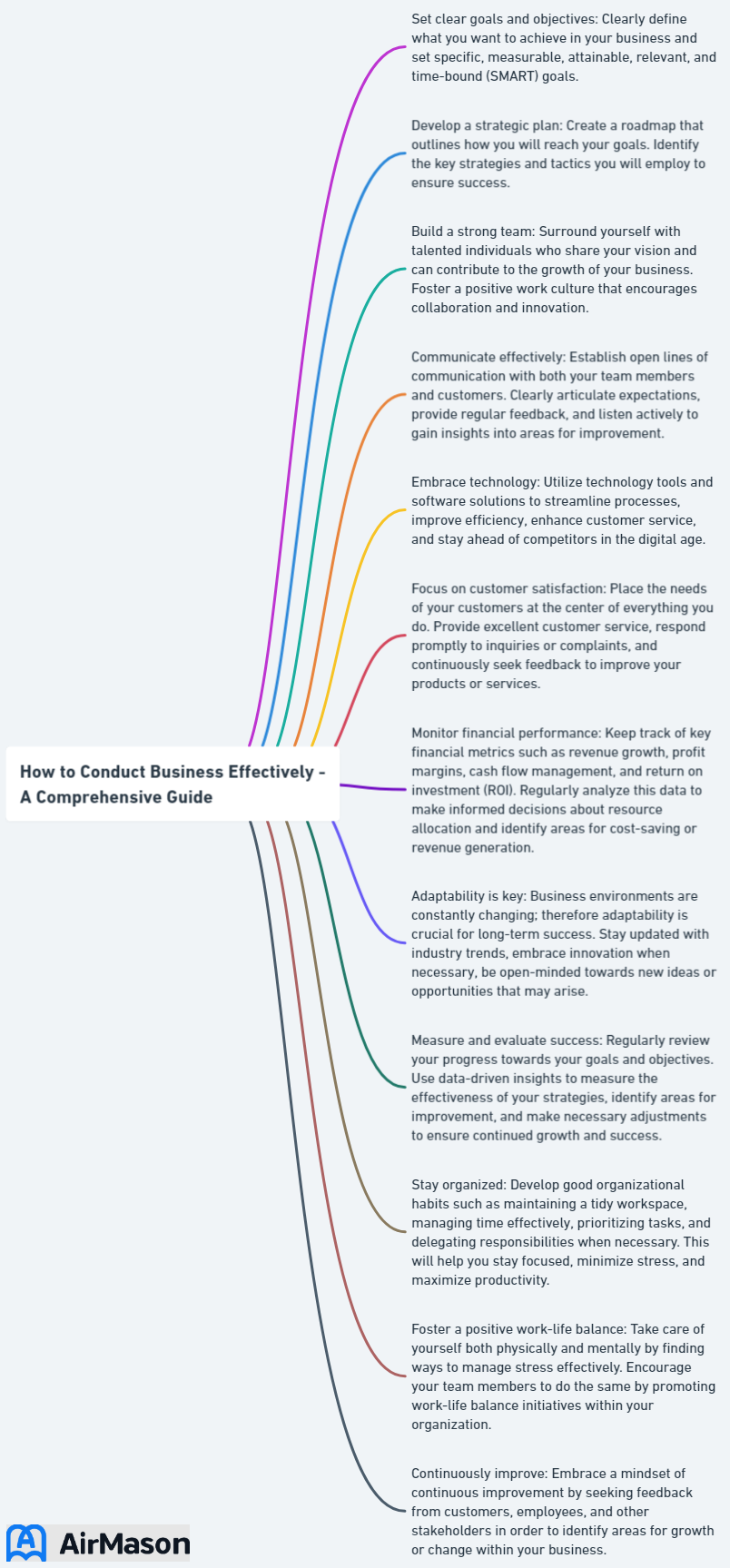
In a world of cutthroat competition, understanding the ins and outs of effective business conduct has never been more crucial. Companies that conduct business ethically and responsibly stand out from the crowd, attract customers, and ultimately achieve greater success. This comprehensive guide delves into the intricacies of business conduct, providing valuable insights and strategies for organizations seeking to excel in today’s fast-paced, global market.
Key Takeaways
- Understanding and adhering to ethical standards is essential for successful business conduct.
- Strategies such as creating a code of conduct, providing employee training, and implementing monitoring systems are key in fostering trust with stakeholders.
- Case studies show that businesses can achieve long-term success through responsible operations and corporate social responsibility.
Understanding Business Conduct
Business conduct refers to the way companies and their employees interact with various stakeholders, such as customers, suppliers, and the community, through their business activities. It encompasses the core values and principles that guide businesses in providing ethical and responsible operations, which are crucial for establishing a positive reputation and long-term success. Understanding the business meaning behind these interactions is essential for companies to maintain their integrity and uphold their values.
Gaining insights into the nuances of business conduct allows organizations to harmonize their operations with their company’s mission and values, fostering a productive relationship with all stakeholders.

Definition of Business Conduct
Business conduct is the manner in which organizations and their personnel interact and operate with stakeholders. Many organizations prioritize ethical business conduct, aiming to maintain a positive reputation and ensure long-term success.
Developing a code of conduct is pivotal, it sets behavioral expectations and guides employees on matters like accepting gifts, conflict of interest, and other ethical dilemmas. Moreover, various international codes of conduct have been developed to aid businesses operating across borders, ensuring that they adhere to global standards of ethical conduct.
Role of Business Conduct in Organizations
Business conduct has a direct influence on a company’s reputation and success. Ethical practices and positive actions contribute to a strong reputation, attracting clients, customers, and partners, while fostering trust and respect among co-workers.
Furthermore, business conduct impacts corporate governance within organizations, promoting ethical practices, transparency, and accountability. Organizations that abide by a code of conduct and uphold ethical behavior can cultivate trust with stakeholders, enhance their reputation, and secure long-term sustainability.
Core Values and Principles
At the heart of ethical business conduct lie core values and principles such as:
- Honesty
- Integrity
- Trustworthiness
- Loyalty
- Fairness
- Concern for others
- Respect for others
These values provide a framework for decision-making and guide the actions and attitudes of employees within the organization, helping to create a company culture that fosters integrity, bolsters employee commitment, and enables ethical and responsible choices.
This company culture can help to ensure that employees are making decisions that are in line with the company’s code.
Code of Conduct Examples
Code of conduct examples are essential for guiding individuals and groups within an organization, community, or online platform on appropriate behavior and standards of ethics. These examples provide clear guidelines on how to interact, communicate, and collaborate in a respectful and inclusive manner. A well-crafted code of conduct not only defines the acceptable behavior but also sets the expectations for addressing conflicts, harassment, and discriminatory actions. It promotes a culture of respect, diversity, and fairness, fostering a positive environment where everyone can thrive. By illustrating real-world scenarios and expected responses, code of conduct examples help educate members on the principles and values that underpin a healthy and harmonious community or workplace.
Strategies for Effective Business Conduct

Organizations can improve business conduct by formulating a code of conduct, facilitating employee training and awareness programs, and employing monitoring and enforcement mechanisms.
Integrating these strategies into their business plan allows companies to address compliance issues, maintain ethical practices, and ultimately achieve their objectives.
Developing a Code of Conduct

A detailed and explicit code of conduct is vital in outlining expected behaviors and directing employees. This includes addressing:
- Ethical behavior
- Respect for diversity
- Compliance with laws and regulations
- Protection of confidential information
To develop a code of conduct, organizations should consult with stakeholders, research relevant best practices, and draft a document that outlines the organization’s values and expectations.
Employee Training and Awareness
Employee training and awareness initiatives are vital in guaranteeing that employees comprehend and follow the code of conduct. These programs help employees:
- Become aware of ethical and legal matters
- Appreciate the importance of ethical behavior
- Equip them with the knowledge and skills to make ethical choices.
Successful examples of employee training and awareness programs include Google’s “Do the Right Thing” program, Microsoft’s “Ethics in Action” program, and Apple’s “Think Different” program.
Monitoring and Enforcement
Monitoring and enforcement tools are necessary to assure compliance with the code of conduct and to handle violations. Businesses can implement the following measures to promote adherence to the code of conduct and maintain a culture of integrity and ethical behavior:
- Reporting mechanisms
- Investigation processes
- Disciplinary actions
- Regular training and education
Additionally, technology can assist in:
- Monitoring and enforcing the code of conduct
- Facilitating the collection, monitoring, and exchange of personal data
- Ensuring compliance with anti-corruption laws.
Code of Conduct Template
A “code of conduct template” serves as a foundational framework for guiding ethical behavior and defining acceptable conduct within a specific context, be it an organization, community, or event. This predefined structure helps establish clear expectations, values, and principles that individuals are expected to adhere to. Utilizing a “code of conduct template” provides several advantages, such as promoting a safe and respectful environment, preventing potential conflicts, and ensuring a consistent approach to addressing violations. Moreover, it enables customization to suit the unique needs and objectives of the entity implementing it, aligning with their mission and values. By using a “code of conduct template” as a starting point, organizations can streamline the development of a robust and effective code of conduct, fostering a positive and inclusive culture.
The Importance of Ethics in Conducting Business

Ethics play a vital role in conducting business, as they provide a structure for making decisions and taking action. Ethical business conduct consists of corporate social responsibility, environmental sustainability, and adherence to laws and regulations, which help organizations foster trust among stakeholders, strengthen their reputation, and cultivate a productive work environment.
Grasping the core values and principles of business ethics enables organizations to navigate business complexities and make informed decisions in line with their mission and values.
Ethical Decision-Making
Ethical decision-making is the process of making decisions based on ethical principles and values. It involves assessing the potential outcomes of a decision and determining whether it is the most judicious course of action.
Ethical decision-making requires individuals to contemplate the repercussions of their decisions on all stakeholders, including:
- customers
- employees
- suppliers
- the environment
Engaging in ethical decision-making allows organizations to align their actions and decisions with their core values and principles.
Corporate Social Responsibility
Corporate Social Responsibility (CSR) contributes to business ethics by promoting ethical behavior and responsible business practices. Companies that engage in CSR initiatives voluntarily take actions to contribute to society and address social and environmental issues, which aligns with ethical principles such as fairness, integrity, and accountability.
Integrating CSR into operations demonstrates a commitment to ethical conduct, transparency, and sustainability, which can enhance reputation and build trust with stakeholders. Additionally, CSR initiatives can have a positive impact on employee morale, customer loyalty, and long-term business success.
Compliance with Laws and Regulations
Compliance with laws and regulations is a fundamental aspect of ethical business conduct. Adhering to the code of conduct helps organizations address compliance issues and maintain ethical business practices.
Failing to comply with laws and regulations can result in legal sanctions, a tarnished reputation, and financial losses. Understanding and adhering to relevant laws and regulations enable businesses to maintain their competitive advantage and sustain confidence among their customers, partners, and employees.
Managing Business Relationships

Effective management of a business relationship is crucial for maintaining trust and fostering positive interactions with stakeholders. This involves clear and transparent communication, respecting confidentiality and proprietary information, and employing conflict resolution and negotiation strategies.
Understanding and implementing these strategies enable organizations to forge robust, enduring business relationships that contribute to their overall success.
Communication and Transparency
In the realm of business relationships, communication and transparency are vital for building trust and fostering positive interactions between parties. Open and honest communication promotes:
- Understanding
- Collaboration
- Navigating cultural differences
- Addressing potential issues before they escalate
By prioritizing transparency and maintaining open lines of communication, organizations can establish strong, lasting relationships that contribute to their overall success.
Respecting Confidentiality and Proprietary Information
Respecting confidentiality and proprietary information is essential in business dealings, as it safeguards a company’s competitive edge and upholds confidence with customers, partners, and employees. Unauthorized disclosure of confidential information can result in legal and financial repercussions, as well as damage to a company’s reputation.
To protect confidential and proprietary information, businesses should implement access control measures, encrypt data, and use secure communication channels.
Conflict Resolution and Negotiation
Conflict resolution and negotiation are essential aspects of managing business relationships. Here are some steps to follow:
- Communicate respectfully.
- Remove the emotional component.
- Establish the facts.
- Find common ground.
- Set the foundation.
- Have an open and honest conversation.
By following these steps, businesses can resolve conflicts and reach mutually satisfactory resolutions.
Mastering these strategies enables organizations to maintain healthy business relationships and achieve long-term success.
What Do You Understand by Privacy and Code of Conduct
Privacy and code of conduct are two fundamental concepts that play a crucial role in various aspects of our lives, especially in the digital age. Privacy refers to the right of individuals to keep their personal information and activities confidential and secure. It encompasses the protection of personal data, control over who has access to it, and the assurance that it won’t be misused. Code of conduct, on the other hand, pertains to a set of ethical and behavioral guidelines that dictate how individuals should act, particularly in professional and social settings. It establishes the norms, values, and expected behavior within a specific community or organization.
Leveraging Technology for Competitive Advantage

In today’s rapidly evolving business landscape, leveraging technology for competitive advantage is crucial for organizations seeking to excel in the global market. Technology plays a vital role in conducting business, including e-commerce, data security, and digital marketing.
By embracing technological advancements, businesses can streamline operations, enhance efficiency, and ultimately achieve their objectives.
E-commerce and Online Transactions
The growth of e-commerce and online transactions has transformed the way businesses operate, enabling them to reach a broader audience and generate new revenue streams. With the increasing prevalence of online shopping, businesses must prioritize data security and privacy to protect customers’ personal and financial information.
Adopting potent digital marketing strategies and ensuring a smooth online transaction experience enables companies to seize the opportunities presented by e-commerce and propel business success.
Data Security and Privacy
Data security and privacy are of paramount importance in conducting business in the digital age. Protecting customer data and ensuring privacy compliance not only safeguards a company’s reputation but also fosters trust among stakeholders.
Businesses should invest in robust security measures, such as encryption and secure payment gateways, to guarantee the safety of customer data during online transactions.
Digital Marketing and Customer Engagement
Digital marketing and customer engagement play a crucial role in driving business success. By utilizing various digital channels, such as social media, email marketing, and content creation, businesses can reach their target audience, establish brand recognition, and create leads.
Engaging with customers online enables organizations to foster relationships and loyalty, ultimately contributing to long-term success.
Human Resources and Talent Management

Human resources and talent management strategies are essential for promoting effective business conduct. Focusing on recruitment and selection, employee development, and performance management enables organizations to nurture a workforce that upholds their values and conduct standards, contributing to their overall success.
Recruitment and Selection
The recruitment and selection process plays a crucial role in building a workforce that upholds organizational values and conduct standards. By attracting and identifying the most suitable candidates for open roles, organizations can ensure a high-performing and diverse workforce that elevates morale and aligns with the company culture.
An effective recruitment and selection process also guarantees that the organization will continue to meet its future needs for qualified employees and abide by laws and regulations.
Employee Development and Retention
Employee development and retention are essential for supporting ethical business conduct. Here are some strategies to consider:
- Provide employees with opportunities for growth and advancement.
- Offer competitive compensation and benefits.
- Foster a positive work environment. By implementing these strategies, organizations can retain talented individuals who align with their values and goals.
Moreover, employee development programs, such as ethics training and education, can instill a strong sense of moral conduct and promote sound decision-making.
Performance Management and Rewards
Performance management and rewards systems are instrumental in reinforcing desired business conduct. By establishing clear expectations and goals, providing regular feedback and coaching, and recognizing and rewarding accomplishments, organizations can create a culture that values ethical behavior and fosters employee commitment.
Successful performance management and rewards systems promote alignment between employee performance and organizational objectives, ultimately driving business success.
Global Business Conduct Challenges

Conducting business globally presents unique challenges and considerations, including cultural differences, international laws, and ethical dilemmas.
Understanding these factors and implementing strategies to navigate them enables organizations to operate successfully in the global market while maintaining a competitive edge.
Navigating Cultural Differences
In a global business context, navigating cultural differences is essential for maintaining effective business relationships and fostering trust among stakeholders. By researching local culture, building personal relationships, and practicing cultural sensitivity, organizations can minimize misunderstandings and maximize collaboration.
Effective communication and transparency are vital in bridging cultural gaps and ensuring the success of international business ventures.
International Laws and Regulations
Understanding and complying with international laws and regulations, such as those set by the European Union, is essential for organizations operating in the global market. By researching and adhering to local laws, businesses can ensure that their operations are conducted ethically and responsibly, maintaining a positive reputation and fostering trust among stakeholders.
Compliance with international business regulations also helps organizations avoid potential legal and financial repercussions, allowing them to focus on growth and success.
Ethical Dilemmas in Global Business
Ethical dilemmas are inherent in global business operations, requiring organizations to strike a balance between profits and social responsibility. Examples of ethical dilemmas faced in global business include bribery and corruption, labor practices and human rights, and environmental impact.
By addressing these dilemmas and implementing strategies for ethical decision-making and corporate social responsibility, organizations can navigate the complexities of the global business landscape and maintain a competitive edge.
Case Studies: Companies with Exemplary Business Conduct
Google, Apple, and Microsoft are renowned for their exemplary business conduct, demonstrating the value of prioritizing ethical behavior and responsible operations. These companies have successfully integrated technology with their business strategy, utilizing web-based applications to drive business success and maintain a competitive advantage.
Learning from their best practices and implementing effective business conduct strategies enables organizations to achieve long-term success in the competitive global market.
Summary
In conclusion, effective business conduct is paramount for organizations seeking to thrive in today’s competitive landscape. By understanding the core values and principles of ethical business conduct, implementing strategies for effective business conduct, and navigating the challenges of global business, organizations can foster trust among stakeholders, maintain a positive reputation, and ultimately achieve long-term success. As the world continues to evolve, prioritizing ethical and responsible business practices will remain a critical aspect of conducting business in the 21st century.
Frequently Asked Questions
What defines a business?
Business refers to an enterprising entity or organization that carries out professional activities for commercial, industrial, or other purposes. They can be for-profit entities earning a profit or non-profit organizations doing it for a charitable mission. Business types range from limited liability companies to sole proprietorships, corporations, and partnerships.
What does conduct business mean?
Conducting business involves providing, offering and soliciting goods, services and/or entertainment.
What is the legal definition of conducted?
Conduct is the act, manner, or process of carrying on or managing, as well as an act or omission to act, and a mode or standard of personal behavior.
What are the core values and principles of ethical business conduct?
Honesty, integrity, trustworthiness, loyalty, fairness, concern for others, and respect for others are the core values and principles of ethical business conduct.
How can organizations develop a code of conduct?
Organizations can develop a code of conduct by consulting with stakeholders, researching best practices, and drafting a document outlining their values and expectations.